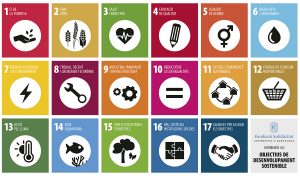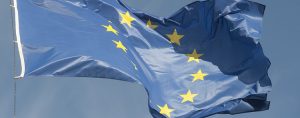The Solidarity Foundation of the University of Barcelona participates in European projects that seek to promote the social inclusion of migrants and refugees in the host communities.
Ongoing projects
Food Includes: reaching, recruiting and engaging excluded learners by harnessing the power of food
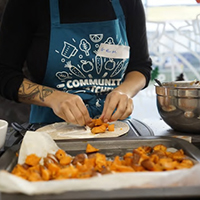 The Solidarity Foundation of the University of Barcelona participates in this Erasmus + project (2023-2026), which seeks to harness the power of food to create new flexible learning opportunities in adult education, which actively improve accessibility, inclusion and skills development of those adults who are difficult to reach; among which, newcomers to the community.
The Solidarity Foundation of the University of Barcelona participates in this Erasmus + project (2023-2026), which seeks to harness the power of food to create new flexible learning opportunities in adult education, which actively improve accessibility, inclusion and skills development of those adults who are difficult to reach; among which, newcomers to the community.
To achieve this, the initiative will equip adult educators with the knowledge and skills to use food as a pedagogy for teaching language, literacy, numeracy and transversal skills, thus reaching excluded learners and involving them in education.
Include Me +: Inclusion, Participation and Peacebuilding through Mediation in Digital Media
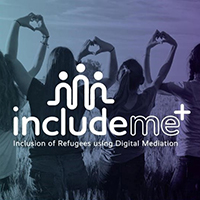 The Solidarity Foundation of the University of Barcelona participates in this Erasmus + project (2023-2026), which seeks to contribute to inclusion through mediation in the field of digital media. For this reason, Include Me + proposes to develop an educational program with which to empower higher education professionals, digital media agents, civil society organizations and students, so that they become responsible and active collaborators in shaping the future of these media.
The Solidarity Foundation of the University of Barcelona participates in this Erasmus + project (2023-2026), which seeks to contribute to inclusion through mediation in the field of digital media. For this reason, Include Me + proposes to develop an educational program with which to empower higher education professionals, digital media agents, civil society organizations and students, so that they become responsible and active collaborators in shaping the future of these media.
The initiative, coordinated by Åbo Akademi University (Finland), is a continuation of the Include Me: Inclusion through Mediation project (2020-2022).
STEAMigPOWER: STEAM approaches at higher education for mIGrants, refugees and asylum seekers’ emPOWERment
 The Solidarity Foundation of the University of Barcelona participates in this European project, which seeks to attract immigrants, refugees and asylum seekers to universities so that they acquire the educational tools necessary to join the labor market and develop knowledge, skills and values that lead to continued wealth and prosperity for them and for the communities where they integrate.
The Solidarity Foundation of the University of Barcelona participates in this European project, which seeks to attract immigrants, refugees and asylum seekers to universities so that they acquire the educational tools necessary to join the labor market and develop knowledge, skills and values that lead to continued wealth and prosperity for them and for the communities where they integrate.
The three-year project (2022-2025) is co-financed by the European Union (Erasmus+ Program) and coordinated by the Universidade do Minho (Portugal). Also participating are the Universita degli studi di Perugia (Italy), the Middle East Technical University (Turkey), Aristotelio Panepistimio Thessalonikis (Greece) and S.E.A.L Cyprus (Cyprus).
Projects in which we participate
COMET (COMplementary patways nETwork)
 As an expert organization in the management of refugee complementary pathways (through the study visa), the Solidarity Foundation of the University of Barcelona participates in the technical committee of this project, led by the Catalan Development Cooperation Fund, which seeks to deepen the design and implementation of new ways complementary to resettlement.
As an expert organization in the management of refugee complementary pathways (through the study visa), the Solidarity Foundation of the University of Barcelona participates in the technical committee of this project, led by the Catalan Development Cooperation Fund, which seeks to deepen the design and implementation of new ways complementary to resettlement.
Completed projects
SMILE: Social Meaning Impact through LLL Universities in Europe
 The Solidarity Foundation of the University of Barcelona participates in this European project, whose main objective is to develop and implement innovative methods and practices to foster inclusive education and promote common values in Higher Education (HE).
The Solidarity Foundation of the University of Barcelona participates in this European project, whose main objective is to develop and implement innovative methods and practices to foster inclusive education and promote common values in Higher Education (HE).
Specifically, SMILE project will encourage the participation, progress and achievement of disadvantaged learners in HE, by supporting educational staff to address diversity (in relation to ethnicity, women’s leadership and socioeconomic status) and strengthening diversity among educational staff.
The project is co-funded by the European Union (through the Key Action 3 of Erasmus+ Programme: Social Inclusion and Common Values: the Contribution in the Field of Education and Training), and it is coordinated by EUCEN (European University Continuing Education Network).
COMMUNITY
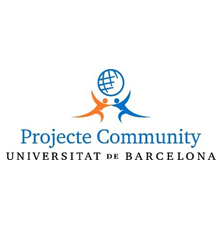 As an entity specialized in inclusion and refuge, the Solidarity Foundation of the University of Barcelona manages the COMMUNITY project, which aims to promote social inclusion of refugees in host communities through Socio-Sports Meetings, a methodology based on physical activities and sports that is developed in the framework of learning-service. a methodology based on physical activities and sports that is developed in the framework of learning-service. The project is an initiative designed and implemented by the University of Barcelona, with the support of the European Commission.
As an entity specialized in inclusion and refuge, the Solidarity Foundation of the University of Barcelona manages the COMMUNITY project, which aims to promote social inclusion of refugees in host communities through Socio-Sports Meetings, a methodology based on physical activities and sports that is developed in the framework of learning-service. a methodology based on physical activities and sports that is developed in the framework of learning-service. The project is an initiative designed and implemented by the University of Barcelona, with the support of the European Commission.
Include Me: Inclusion through Mediation
The Solidarity Foundation of the University of Barcelona participates in this European project, co-funded by the Erasmus+ Programme (Strategic Partnerships) and coordinated by the Åbo Akademi University (Finland), which seeks to empower learners, activists and migrants to become peer-to-peer mediators in their communities and their wider area, with a view to changing social dynamics.
In order to do so, Include Me develops a Good Practice Guide, identifying the skills, opportunities and best practices on social mediation across Europe; and, based on the results, it will produce open educational resources and a MOOC.
UNI(di)VERSITY
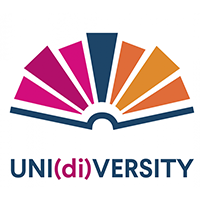 The Solidarity Foundation of the University of Barcelona participates in this European project, built upon the results of the inHERE project and focused on supporting European Higher Education Institutions’ (HEI) efforts to welcome refugee students and staff.
The Solidarity Foundation of the University of Barcelona participates in this European project, built upon the results of the inHERE project and focused on supporting European Higher Education Institutions’ (HEI) efforts to welcome refugee students and staff.
The project broadens the scope of intervention in two ways:
– It moves from a focus on sharing field practices towards sustaining institutional strategic planning.
– It addresses HEIs’ responsibility towards inclusion.
The main objectives of UNI(di)VERSITY are:
– Increase knowledge about outstanding and transferable HEIs’ strategies and approaches towards diversity and inclusion in relation to migration.
– Inspire commitment and support discussion on HEIs’ role as key actors in promoting inclusion and cultural diversity, and addressing related societal challenges.
– Raise awareness amongst the European academic community concerning the social responsibility of HEIs on inclusion in relation to the phenomenon of migration.
– Empower HEIs in the development of 360-degree institutional strategies that cover the full range of universities’ activities (research, teaching, administration, “third mission”).
– Mainstream practices and achievements in a comprehensive framework for action that would support HEIs’ strategic planning in this domain across Europe.
The project, with a duration of two years (2019-2021), is co-funded by the European Union (Eramus+ Programme), and it is coordinated by La Sapienza Università di Roma.
RESCUE: Refugees Education Support in MENA countries
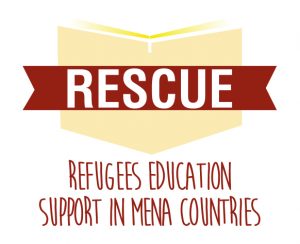 The University of Barcelona, through the Solidarity Foundation of the University of Barcelona, participates in this European project of international cooperation based on an educational support for refugees in the MENA region (Middle East and North Africa).
The University of Barcelona, through the Solidarity Foundation of the University of Barcelona, participates in this European project of international cooperation based on an educational support for refugees in the MENA region (Middle East and North Africa).
The main objective of RESCUE is to support universities in Iraq, Lebanon and Jordan to create and manage ad hoc units for operational support to refugee university students (R-SOS units), whose mission is to structure specific services to assist this group of students in resuming their academic training.
The project, with a duration of three years (2016-2019), is co-funded by the European Union (through the call KA2 for Building Higher Eduacation Capacities of Eramus+), and it is coordinated by the Union of Mediterranean Universities (UNIMED).
inHERE: Higher Education Supporting Refugees in Europe
The University of Barcelona, through the Solidarity Foundation of the University of Barcelona, is one of the European partner institutions of the project Higher Education Supporting Refugees in Europe (inHERE), whose main objective is to facilitate the access and integration of refugees in the European Higher Education Area.
 To this end, inHERE has developed a series of tools for the acceptance of refugees at the university:
To this end, inHERE has developed a series of tools for the acceptance of refugees at the university:
– Guidelines for university staff members.
– Recommendations to institutions, networks and policy makers in higher education.
– Living Lab (webinars and multiplier events on practices and policies for the integration of refugees into higher education).
The inHERE project, with a duration of two years, has been co-funded by the European Union and coordinated by the Union of Mediterranean Universities (UNIMED). In addition to the University of Barcelona and UNIMED, other partners of the project included the EUA-European Universities Association, the University of Rome La Sapienza and Campus France. The United Nations High Commissioner for Refugees (UNHCR) was an associated member.






